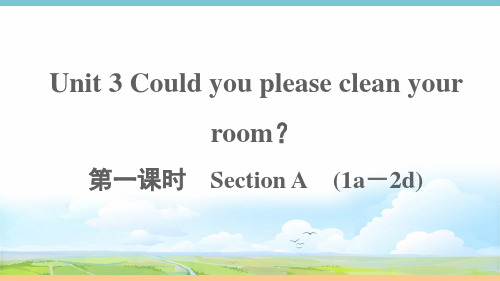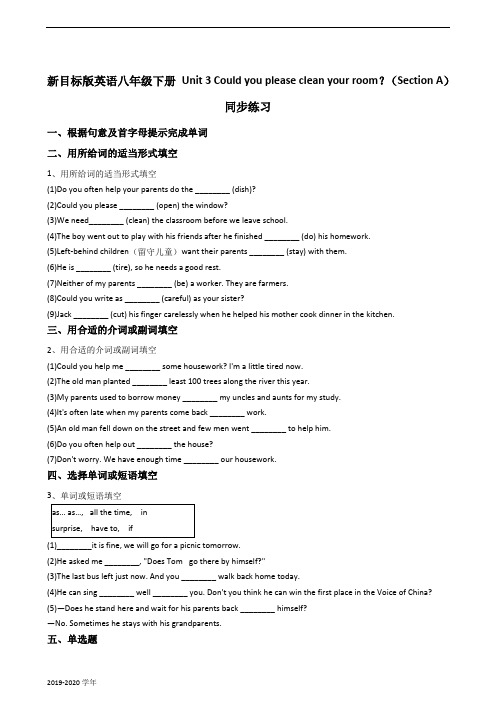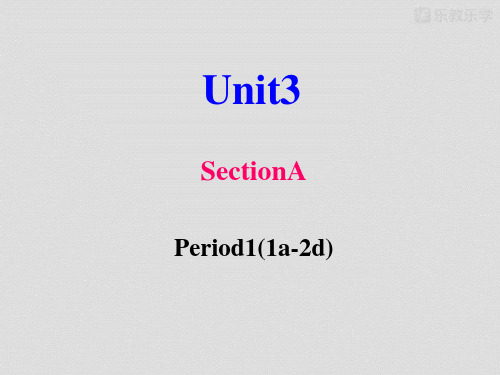八年级英语下册Unit3CouldyoupleasecleanyourroomSectionA1a_2d知能演练提升人教
八年级英语下册Unit3Couldyoupleasec作业课件人教版(3)

四、单项选择。
( B )1.—______ you go out to play sports after school? —Yes,sure!Where are we meeting?
A.May
B.Could
C.Mlook at your pictures?
3.It smells terrible.Please ___ta_k_e__o_u_t___ the rubbish. 4.—Could you please clean your room?
—Sorry,I can't.I ___h_a_v_e__to____ do my homework. 5.She often _g_o_e_s_t_o_t_h_e_m__o_v_i_e_s_ to relax herself.
Unit 3 Could you please clean your room?
第一课时 Section A (1a-2d)
目录页
听力专训 基础积累 能力提升
一、听力(共两节) 第一节 听句子,选择与句子内容相符的图片。(听一遍)
1.Mom,could I help you make dinner? 2.Lily was ill.Let's visit her together after school. 3.Tom often helps his mom take out the rubbish. 4.Alice is cleaning the living room now. 5.Mike often washes the dishes after lunch.
A.watch
B.to watch
C.watched
D.watching
2014八年级英语下册unit3_could__you_please_clean_your_room SectionA

Sure.
/Of course/certainly
Could you please fold your clothes?
Sure.
/Of course/Certainly.
Shitou, could you please clean the living room?
--
Sorry ,I can’t.
• Peter, could you please take out the trash?
--Peter, could you please take out the rubbish? --Sure, Mum. =Of u please make your bed?
注:could是情态动词can的过去式,但在本句中 Could you do…?不表示过去,用以表示礼貌,委婉 或不确定的语气。
2.表示家务的短语
洗餐具 do the dishes take out the rubbish 倒垃圾 fold your clothes 叠你的衣服
家务
sweep 扫地 the floor make your bed 整理床铺
Learn to make a polite request and ask for permissions.
Difficult point
Improve students’ autonomous learning skill and cooperative skill
自主学习
Talk about the housework. A: What kind of chores did you do last weekend? B: I did the washes.
Key points
新目标版英语八年级下册Unit3Couldyoupleasecleanyourroom?(SectionA)同步练习

新目标版英语八年级下册Unit 3 Could you please clean your room?(Section A)同步练习一、根据句意及首字母提示完成单词二、用所给词的适当形式填空1、用所给词的适当形式填空(1)Do you often help your parents do the ________ (dish)?(2)Could you please ________ (open) the window?(3)We need________ (clean) the classroom before we leave school.(4)The boy went out to play with his friends after he finished ________ (do) his homework.(5)Left-behind children(留守儿童)want their parents ________ (stay) with them.(6)He is ________ (tire), so he needs a good rest.(7)Neither of my parents ________ (be) a worker. They are farmers.(8)Could you write as ________ (careful) as your sister?(9)Jack ________ (cut) his finger carelessly when he helped his mother cook dinner in the kitchen.三、用合适的介词或副词填空2、用合适的介词或副词填空(1)Could you help me ________ some housework? I'm a little tired now.(2)The old man planted ________ least 100 trees along the river this year.(3)My parents used to borrow money ________ my uncles and aunts for my study.(4)It's often late when my parents come back ________ work.(5)An old man fell down on the street and few men went ________ to help him.(6)Do you often help out ________ the house?(7)Don't worry. We have enough time ________ our housework.四、选择单词或短语填空3、单词或短语填空(1)________it is fine, we will go for a picnic tomorrow.(2)He asked me ________, "Does Tom go there by himself?"(3)The last bus left just now. And you ________ walk back home today.(4)He can sing ________ well ________ you. Don't you think he can win the first place in the Voice of China?(5)—Does he stand here and wait for his parents back ________ himself?—No. Sometimes he stays with his grandparents.五、单选题4、If Nancy ________ the exam, she will go to Australia for English study.A、passB、passedC、passesD、will pass5、Last year I ________ drive. I used to take the bus.A、couldB、couldn'tC、shouldn'tD、should6、—Can you finish________ these books before 10 o'clock?—Yes, I can.A、to readB、readC、readsD、reading7、—What do you usually do ________ your parents aren't at home?—I do my homework. Sometimes I watch TV or play computer games.A、becauseB、whileC、butD、before8、Peter likes pop music, but ________ his father ________ his mother likes it.A、both, andB、not only; but alsoC、neither; norD、either, or9、—Can I ________ your bike?—With pleasure. But you mustn't ________ it to others.A、lend, borrowB、borrow, lendC、lend; lendD、borrow; borrow10、Peter speaks Chinese well indeed, but of course not ________ a local speaker in China.A、so fluently asB、more fluent thanC、as fluent asD、much fluently than11、—Could I borrow your camera?—________, but please give it back by Saturday.A、I'm sorryB、Of courseC、Certainly notD、No, thanks12、—Where can I find a ________ hall to hold so many people?—There is one in the tall building.A、small enoughB、big enoughC、enough smallD、enough big13、—__ __?—No problem.A、Did you have a penB、What time did you get up this morningC、Could you help me with houseworkD、How often do you visit your parents六、根据句意,将下列句子中的画线部分译成汉语或英语14、根据句意,将下列句子中的画线部分译成汉语或英语(1)The boy often helps his parents take out the rubbish when he is free.________(2)My daughter can make the bed well without any help.________(3)Don't stay out late, or I will worry about you.________(4)It's good for you to help out around the house after school.________(5)He 扔下his bag and ran away.________(6)一……就…… the bell rang, the children ran out of the classroom. ________(7)A rich woman often带着狗去散步in the park after supper.________(8)Are you和你的朋友闲逛?________(9)Almost everyone wants to拥有一个干净而舒适的家。
2014人教版新目标英语八年级下Unit3_Could_you_please_clean_your_room_sectionA_(2d to3c)

“Could I watch one show first?” I asked. “No!” she replied angrily. “You watch TV all the time and never help out around the house! I can’t work all day and do housework all evening.” “Well, I work all day at school, too! I’m just as tired as you are!” I shouted back.
• 1) What did Nancy want to do? • She wanted to watch one TV show first. • 2) What does Nancy’s mother do during the day? And what does she have to do in the evening? • She has to work all day and she has to do housework all evening. • 3) Which sentence has the same meaning as “You’re tired, but I’m tired too.” • I’m just as tired as you are.
“Could I watch one show first?” I asked. “No!” she
副词,生气地
replied angrily. 一直;总是 帮 忙 “You watch TV all the time and never help out around
the house! I can’t work all day and do housework all 整个晚上 evening.” “Well, I work all day at school, too! I’m just as tired as
英语人教版八年级下册Unit 3 Section A 1a-2d 教学设计

新目标八年级下册Unit 3 Could you please clean the room?Section A 1a-2d石家庄第二外国语学校周洁1.教材分析人民教育出版社《Go For It》教材不仅帮助学生学习英语语言知识,同时帮助学生发展语言运用能力,学会用英语表达思想,与人交流,用所学知识来解决问题。
各个单元以不同主题为线索,为学生设计了许多贴近生活、具有交际意义的任务或活动,以此激发学生英语学习的热情,使学生在较为真实的情境中感知语言,应用语言,参与课堂。
Unit3 Could you please clean your room? 以“家务和许可”为主题,以主动帮助家人做家务的实例,引导学生强化劳动观念,学会照顾自己,培养自身独立意识。
2.学情分析在学校分层小班教学的背景下,所教授的小班为A班,学生英语基础相对薄弱,需要夯实基础,稳扎稳打;他们有着极强的表现欲,需要在课堂训练中有更多机会展现自我;他们在英语学习上欠缺自信,需要得到教师的肯定以及自我认同;个别同学欠缺英语学习热情,需要在生动活泼的课堂中感受快乐。
3.教学目标语言知识(Language knowledge)(1)围绕本单元话题,学会准确地读出和使用rubbish, fold, sweep, floor, throw, borrow, lend,chore等词语。
(2)准确把握情态动词could的用法,能够礼貌地向他人用“Could you please…?”提出要求,用“Could I…?”请求许可,并对二者礼貌应答。
语言技能(Language skills)能够熟练应用“Could you please…?”提出要求,应用“Could I…?”请求许可,并能够礼貌回应他人的要求及请求;通过听力和阅读,获取所需细节信息;通过小组合作的方式,对提出要求和请求许可进行巩固训练,实现礼貌而顺畅的沟通。
学习策略(Learning strategies)养成自主预习,自主探究,合作互助的学习习惯;通过提前预览,预测听力所填内容;通过自主感知英语语言,总结规律,并加以应用。
人教版英语八下课件Unit3Couldyoupleasecleanyourroom(3)

Languagepoints
takeout拿出来,取出来
Hetookadictionaryout.
他拿出来一本字典。 take…outof…把…从…拿出来 Hetookadictionaryoutofhisbag. 他从书包里拿出来一本字典。
workon从事,忙于=workat Heisworkingonanewnovel. 他正在写一部小说。 Ihavebeenworkingatmyassignmentallda y. 我整天都在做作业。
Shefoldsherclothes.
ቤተ መጻሕፍቲ ባይዱ
Couldyoupleasecleanyourbedroom? Couldyoupleasecleanyourlivingroom? Yes,sure.Yes,sure. CouldIopenthedoor? CouldIsweepthefloor? Yes,youcan.Yes,youcan.
Decidewhethertheunderlinedwordsint 3c hesentencesareverbsornouns.Thenwrit eanothersentenceusingtheunderlinedw ordintheotherform.
1.Couldyoutakethedogforawalk?(noun)Iwa lkedhomefromschool.(verb)
Readthesentencesbelow.Underlineth 3b esentencesfromthereadingthatmeant hesamething. 1.Neitherofusdidanyhouseworkforawee k.
Foroneweek,shedidnotdoanyhouse workandneitherdidI.
Unit3 SectionA 2d 2022-2023学年人教版英语八年级下册
She could play the piano when she was five. 2.在表示请求许可时,没有时间区别,在语气上could 更加委 婉客气. can常用于熟人之间或长辈对晚辈,上级对下级的场合。 could常用于非熟人之间或晚辈对长辈,下级对上级的场合。 如: Can I use your pen?
Could we get something to drink after the No, you can’t, you have a
movie?
basketball game tomorrow.
情态动词 could
八年级英语下册Unit3《Couldyoupleasecleanyourroom》(讲)(含解析)(新版)人教新目标版
Unit 3《Could you please clean your room》一、教材分析本单元的主要语言功能是礼貌地请求别人做某事和向他人请求允许做某事,语法项目是Could you please do…?和Could I do …?从教材的整合来说它是Can you do…?(表请求)和Can I do …?(请求许可)的延续,只是表达更委婉,更有礼貌。
从本单元来说,它既是本单元的基本语言内容,又为本单元知识扩展和综合语言运用奠定坚实的基础。
本单元话题又贴近他们的生活,应该会有话可讲,有话要讲。
二、重、难点知识点提示重点:让学生掌握词汇的运用以及用Could you please do…? Could I do…?两个句型提出请求和请求许可。
难点:本节课表示家务的动词词组较多,较难记忆和运用。
三、重点知识点讲解:考点(一)词语辨析Ⅰ. either/neither /none/ all/ both的用法。
either:1.否定句中的“也”。
如 A:I don't like music.B: Me either.(A说:我不喜欢音乐。
B说:我也是)2.两者其中之一。
如:A:Which would you like to drink,water or tea? B:Either of them is ok.(A说:你喜欢喝水还是茶?B:说哪种都行。
)neither:两者都不。
如:Neither of my parents has been to Baijing.(我父母两人都没去过北京)。
特殊句式:neither…nor… Neither you nor me am a doctor.(不论你还是我都不是医生)此结构中be的形式根据临近它的主语而定,即就近原则。
表达“……也不……” 则用“Neither /Nor + be / V助 / V情 + 主”—The first one wasn’t bad. — Neither was the second.both:两者都。
【人教新目标版】八年级英语下册Unit3Couldyoupleasecleanyourroom练习题(含答案)
Unit 3 Could you please clean your room单元训练Ⅰ.单项选择1.(2017·山东临沂)—Could you please take out the rubbish?—B.But I want to drink a cup of water first.A.Thank youB.Sure,no problemC.You’re welcomeD.No,I can’t2.(2017·黑龙江哈尔滨)If we travel abroad,we prefer to stay in five-starhotels.That’s because they B guests with the best service to make them feel at home.A.previewB.provideC.prevent3.(2017·湖南邵阳)My little brother didn’t go to bed until he finished B his homework last night.A.doB.doingC.to do4.(2017·辽宁营口)The C children learn to be independent,the it is for their future.A.earlier;bestB.earliest;bestC.earlier;betterD.early;good5.(2017·重庆渝北)It isn’t easy for us D English well.A.learnB.learnsC.learningD.to learn6.(2016·山东济宁)We should be kind to the old and take care A them in daily life.A.ofB.forC.withD.about7.(2016·黑龙江绥化)She is listening to music C he is doing his homework.A.afterB.beforeC.while8.(2016·天津)Don’t C any more time,or we will miss the meeting.A.saveB.trustC.wasteD.love9.(2017·湖南邵阳期末)They should spend their time on schoolwork C they can get good grades and get into a good university.A.in orderB.in order toC.so that10.(2017·浙江余姚模拟)He has to work hard,because his wife C him.A.depend onB.dependsC.depends onD.dependedⅡ.根据句意、首字母或汉语提示填写单词1.(2017·湖北恩施)Government has p rovided children in poor areas with food for free since 2011.2.(2017·贵州铜仁)They often b orrow books from the library.3.(2017·四川乐山)I don’t want to waste(浪费)my time talking with her.It’s like playing the lute to a cow.4.(2016·山东聊城)Please pass(传递)the ball to me.5.(2016·新疆阜康米泉)Jim lives at next door.We are neighbors(邻居).阅读理解Many kids do housework such as doing the dishes,making the bed,and folding the clothes.In exchange,they get some money or other computer time.Paying kids for housework is one of the most popular topics,especially at a time when everyone is more careful about money.Some parents think since adults are paid to do their jobs,we should pay kids for everyday housework.But some people don’t think kids should get rewards(报酬)for doinghousework.Susie Walton,an expert,believes that by rewarding kids,parents are sending a message that work isn’t worth doing unless you get something in return.“Running any kind of housework is a team effort,” Walton says.“A home is a living spa ce for everyone in the family.It’s important for kids to see that we all have responsibilities in the house,and family decide how they want their home to look,and how they are going to keep it looking like what they want.”Other people believe that getting a reward encourages kids to do housework,and it also teaches them real world lessons about how we need to work to get money.There are also apps(程序)that give kids points and digital gifts that can be redeemed(兑现)either online or in the real world.“Our goa l is to give kids lawful power so they can get rewards,” says Chris Bergman.“And kids need rewards to help encourage them.”1.Which of the following housework is NOT mentioned in Paragraph 1? BA.Washing the dishes.B.Cooking meals.C.Folding the clothes.D.Making the bed.2.The underlined phrase “in return” in Paragraph 3 has the same meaning as“A”.A.as a rewardB.for punishmentC.on saleD.under control3.What is Walton’s idea in the passage?CA.Running exercise is a kind of team work.B.People work to get some rewards.C.Kids have responsibilities in the house.D.Doing housework is only the parents’ job.4.According to Chris Bergman,kids should be encouraged to D.A.do housework without rewardsB.do more houseworkC.stay away from houseworkD.do housework by getting rewards5.Which is the best title for the passage? CA.Kids Should Study as Well as Doing Housework.B.Let Children Do Some Housework.C.Should Kids Be Rewarded for Doing Housework?D.Doing Housework Is Good for Children’s Study.。
人教版八年级英语下册-Unit-3-Could-you-please-clean-your-room-重点词组+重点句型+重点语法+综合练习题
Unit 3 Could you please clean your room 重点词组Section Ado chores 做家务do the dishes 洗碗sweep the floor 扫地take out the rubbish 扔垃圾make the bed 铺床fold the clothes 叠衣服clean the living room 打扫客厅no problem 没问题go out for dinner 出去吃晚饭go to the movies 去看电影stay out 待在外头(不在家)get a ride 骑车have to do sth. 不得不做。
need to do sth. 需要做。
do some work 做一些工作eat breakfast 吃早饭have a basketball game 举行一场篮球赛work on sth. 使用。
工作help out with 帮助解决a few 一点点at least 至少finish doing sth. 完成做某事want sb. to do sth. 想要某人做某事so much 这么多be back 回来any minute 随时/马上clean and tidy 干净整洁be angry with 对某人生气solve the problem 解决问题throw down 扔下in front of 在。
前面come over 过来take...for a walk 带。
去散步all the time 一直all day 整个白天do housework 做家务all evening 整个夜晚shout back 吼叫还击walk away 走开come home from work 下班回家in surprise 惊讶地share the housework 分担家务sit down 坐下hang out 出去玩help sb. (to) do sth. 帮助某人做某事how much 多少come back 回来try (not) to do sth. 努力(不)做某事hate to do sth. 讨厌做某事Section Bask sb. to do sth. 让某人做某事next to 靠近have a party 参加派对have a test 参加考试mean doing sth. 意味着。
- 1、下载文档前请自行甄别文档内容的完整性,平台不提供额外的编辑、内容补充、找答案等附加服务。
- 2、"仅部分预览"的文档,不可在线预览部分如存在完整性等问题,可反馈申请退款(可完整预览的文档不适用该条件!)。
- 3、如文档侵犯您的权益,请联系客服反馈,我们会尽快为您处理(人工客服工作时间:9:00-18:30)。
1
Unit3 Couldyoupleasecleanyourroom?
SectionA(1a-2d)
知能演练提升
Ⅰ.根据句意及首字母或汉语提示完成单词
1.Would you please clean up the (杂乱)?
2.He lives on the tenth f .
3.Do they often s the street on Sundays?
4.The dustman(垃圾工) comes once a week to collect the r .
5.He f the letter and put it in an envelope(信封).
Ⅱ.用括号内所给单词的适当形式填空
rain live tell dish be
1.Jane often helps her mother do the at home.
2.Mike is cleaning the room.
3.Jeff, could you me where you live?
4.We won’t go to the park if it tomorrow.
5.Tom, turn off the computer. I think two hours of games enough for
you.
Ⅲ.单项选择
1.Sam! Look at your bedroom. Why don’t you ?
A.finish your homework
B.do the dishes
C.make your bed
D.do the cooking
2.— ?
—Yes, sure.
A.Could you please help me
B.What are you going to do
C.How are you
D.Why are you late
3.—Could you please do the dishes?
— .
A.No, I don’t
B.Thank you very much
C.Yes, please
D.Sorry, I have to do my homework first
4.If Bob away from the junk food, he will be in good health.
2
A.stay B.will stay
C.stays D.stayed
5.—Manuel, could I use your computer?
—Sorry, I’m going to it now.
A.work in B.work at
C.work on D.work over
Ⅳ.翻译句子
1.——请你洗一下餐具好吗?
——当然可以。
—
—
2.——请你扫一下地好吗?
——对不起, 我不能。我要做我的家庭作业。
—
—
3.——请你把垃圾拿出去好吗?
——没问题。
—
—
4.——请你叠一下你的衣服好吗?
——对不起, 我很忙。
—
—
5.——我能去看电影吗?
——不, 你不能。你明天要考试。
—
—
★Ⅴ.任务型阅读
Many parents think it’s very difficult to get their children to do chores.But I
don’t think so.
My daughter is ten years old. At night, I write down her chores for the following
day. Then I stick(贴) the paper with chores on her door. Usually she gets three to
eight chores a day. It depends on how she does chores. If she does all of her chores
well, she can get fewer chores next day. The chores are some easy ones,
sweeping the floor, folding the clothes and cleaning the table after dinner.
For my other two children, the chores are different because they are very young.
They both know how to put their empty dinner plates in the dishwasher. My 19-month-
old son helps me put the dirty clothes in the washing machine when I am doing the
3
laundry.我在院子里干活时他们也帮助我。They help me pick up the sticks(树枝) and throw
them away.
根据短文内容, 完成下列任务。
任务一: 将文中画线的英语句子译成汉语。
1.
任务二: 将文中画线的汉语句子译成英语。
2.
任务三: 在横线上填入适当的短语, 使句意通顺、完整。
3.
任务四: 回答下列问题。
4.According to the passage, how many children does the writer have?
5.How does the writer’s ten-year-old daughter know her chores?
参考答案
Ⅰ.1.mess 2.floor 3.sweep 4.rubbish 5.folded
Ⅱ.1.dishes 2.living 3.tell 4.rains 5.is
Ⅲ.1.C 2.A 3.D 4.C 5.C
Ⅳ.1.—Could you please do the dishes?
—Yes, sure.
2.—Could you please sweep the floor?
—Sorry, I can’t. I have to do my homework.
3.—Could you please take out the rubbish?
—No problem.
4.—Could you please fold your clothes?
—Sorry, I’m very busy.
5.—Could I go to the movies?
—No, you can’t. You will have a test tomorrow.
Ⅴ.1.很多父母认为让孩子做家务是非常困难的。
2.They can also help me when I’m working in the yard.
3.such as
4.Three.
5.By reading a piece of paper with chores on her door.
4
